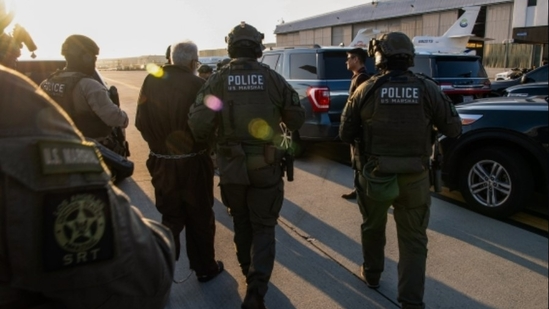First photos of Tahawwur Rana being handed over to Indian authorities surface

Tahawwur Rana’s Extradition: A Step Toward Justice for the 26/11 VictimsTahawwur Rana’s Extradition: A Key Step in the Pursuit of Justice for the 26/11 Victims
On Thursday, Tahawwur Rana, a co-conspirator in the 2008 Mumbai terror attacks, was extradited from the United States and handed over to Indian authorities. This moment marks a significant step forward in holding those responsible for the 26/11 attacks accountable. Rana’s role in the deadly attacks, which killed 166 people and injured over 238, makes his extradition crucial for ongoing investigations. Photos from the extradition process showed him being escorted by US Marshals before being transferred to Indian custody.
NIA Takes Custody of Rana for Interrogation
Upon landing in Delhi, the National Investigation Agency (NIA) took immediate custody of Rana for a period of 18 days. During this time, the NIA plans to interrogate him thoroughly to uncover more details about the planning and execution of the 26/11 attacks. The agency aims to gather vital information regarding the terrorists’ coordination, resources, and training.
In the court hearing, the NIA presented solid evidence, including emails sent by Rana, which further justified his custody. The NIA stressed the importance of his questioning in understanding the full scope of the conspiracy.
Rana’s Involvement in the 26/11 Attacks
Tahawwur Rana, a Pakistani-Canadian businessman, played a crucial role in facilitating aspects of the 26/11 terror attacks. His alleged involvement in arranging safe houses and providing logistical support for the attackers’ travel plans was vital for the success of the operation. Despite Rana’s denials, his coordination with David Headley, the main planner of the attacks, is crucial to understanding how the attack was carried out.
Rana’s involvement in providing resources and support for the attackers underscores the severity of his actions. While he claims to have had no direct role in the violence, his actions were instrumental in enabling the attack. India’s relentless pursuit of justice for the 26/11 victims continues, and Rana’s extradition is a significant part of that effort.
The Extradition Process: Legal and Diplomatic Challenges
Rana’s extradition process was not without challenges. He contested the decision, citing various legal grounds to prevent his extradition. However, the US courts ruled in favor of India, allowing the process to move forward. This ruling highlights the importance of international cooperation in the fight against terrorism.
The extradition also strengthens the relationship between India and the US, demonstrating the two countries’ shared commitment to counterterrorism efforts. By working together, they ensure that those responsible for terrorism cannot escape justice, regardless of where they are located.
The Value of Rana’s Testimony
Rana’s testimony during his interrogation holds significant value in the investigation. His knowledge of the logistics behind the operation, including the coordination between the attackers, is crucial in piecing together the entire plan. Additionally, the NIA hopes to uncover the financial transactions that supported the operation. Investigators believe that following the money trail could uncover deeper connections to terrorist organizations and other co-conspirators.
Rana’s questioning could also provide insight into how the attackers were trained and prepared for the mission. Understanding the training process is crucial for understanding the sophistication of the operation and the methods used by the terror network.
Diplomatic Implications of the Extradition
Rana’s extradition also has diplomatic significance for India. It underscores the importance of international legal processes in holding individuals accountable for terrorism, no matter where they are. The process strengthens India’s ability to tackle terrorism on the global stage and sends a message to terrorists everywhere that they cannot escape justice.
The case also highlights the necessity of global cooperation to combat terrorism. By working with the US and other international partners, India can ensure that terrorism is met with the full force of the law. The extradition process demonstrates how countries can collaborate effectively to hold perpetrators accountable and bring justice to victims.
Moving Forward: What’s Next for the 26/11 Investigation?
With Rana now in Indian custody, investigators hope to gather critical information about the 26/11 attacks. His testimony could provide crucial details about the planning and execution of the attack, as well as the identities of other individuals involved in the conspiracy. The NIA will continue its investigation, working with international agencies to uncover the full extent of the operation.
The NIA’s efforts to uncover more information are essential in bringing justice to the victims and ensuring that all those involved in the attack are held accountable. Rana’s extradition is just the beginning of the investigation, and investigators will continue their pursuit of justice.
The Diplomatic and Political Fallout
Rana’s extradition also has significant diplomatic and political consequences. It serves as a reminder of the importance of international cooperation in the fight against terrorism. The US and India’s coordinated efforts to bring Rana to justice send a powerful message to terrorist organizations and their supporters that no one is above the law.
India’s commitment to bringing those responsible for the 26/11 attacks to justice continues to shape its stance on global counterterrorism. The extradition process has not only brought Rana to trial but also reinforced the importance of global partnerships in combating terrorism.
Conclusion: A Step Toward Justice
Tahawwur Rana’s extradition represents a pivotal moment in the fight against terrorism. His role in the 26/11 attacks cannot be overstated, and his return to India is an essential step toward holding those responsible for the attack accountable. As the investigation continues, Rana’s testimony could provide crucial information to help uncover the full conspiracy behind the deadly attacks.
India’s pursuit of justice for the victims of 26/11 remains unwavering, and the extradition of Rana reinforces the country’s commitment to ensuring that those responsible for terrorism face the consequences of their actions. The global fight against terrorism requires cooperation across borders, and this case demonstrates how countries can work together to bring justice to victims and prevent further attacks.






